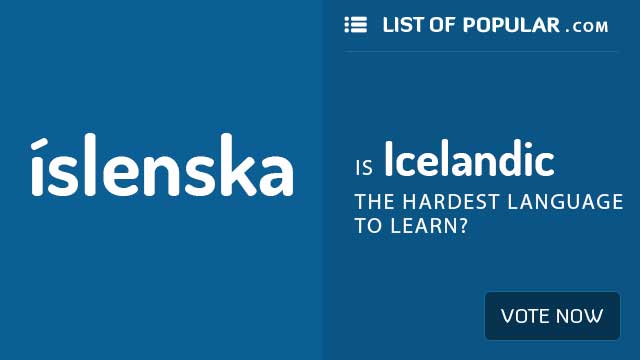Is Icelandic the hardest language to learn?
"Is Icelandic the hardest language to learn?" This question intrigues language enthusiasts and learners alike, as Icelandic, with its intricate grammar, archaic vocabulary, and unique phonology, presents significant challenges for non-native speakers. However, determining whether it is the absolute hardest language to learn requires a thorough examination of its distinctive features and contextual factors.
One of the most daunting aspects of Icelandic for learners is its complex grammar. The language features four grammatical cases, extensive conjugation patterns for verbs, and a plethora of irregularities. Additionally, Icelandic nouns can be declined for gender, number, and case, adding layers of complexity to sentence construction and comprehension.
Moreover, Icelandic vocabulary includes many archaic words and expressions that have been preserved from Old Norse, the language of the Vikings. While this rich linguistic heritage adds cultural depth to the language, it can be challenging for learners to master unfamiliar vocabulary and understand its usage in modern contexts.
Furthermore, Icelandic phonology presents challenges for non-native speakers, particularly in terms of pronunciation and intonation. The language features vowel and consonant sounds that may be unfamiliar to speakers of other languages, requiring careful attention to phonetic details and ample practice to achieve accurate pronunciation.
Despite these challenges, labeling Icelandic as the hardest language to learn overlooks the subjective nature of language acquisition. Factors such as linguistic background, exposure to the language, motivation, and learning strategies play a significant role in determining the difficulty of learning Icelandic.
For example, speakers of other Germanic languages may find certain aspects of Icelandic grammar and vocabulary more familiar compared to speakers of non-Germanic languages. Similarly, learners immersed in Icelandic-speaking environments or with access to quality language resources may overcome obstacles more readily than those without such advantages.
Furthermore, other languages boast their own unique challenges that rival or surpass those of Icelandic. Languages like Arabic with its intricate morphology and writing system, Mandarin Chinese with its tonal nature and logographic script, or Hungarian with its complex agglutinative grammar are often cited as equally or more challenging for learners.
In conclusion, while Icelandic presents significant hurdles for learners, labeling it as the hardest language to learn requires careful consideration of various factors. Ultimately, the difficulty of learning a language is subjective and varies from person to person. Embracing the journey of language learning as a rewarding and enriching experience can empower learners to overcome challenges and achieve proficiency in Icelandic or any other language they choose to pursue.

